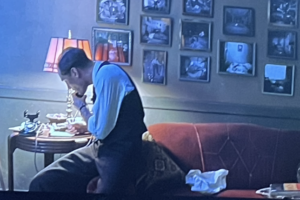Not too long ago our region was shocked by the brutal murder of a psychologist in her Upper East Side office. Of course all of us in private practice, especially if we keep late hours or have offices in our homes, were given pause by this event, and started to rethink some of the ways we practice.
For most of us we got back to our routines quickly, knowing that Dr. Faughey’s murder was an isolated incident, but there were some lawmakers in New York City looking to make changes and make it harder for practitioners to have offices in residential buildings. Specifically, ideas were put on the table that therapists not see "violent" patients in residential buildings, presumably for the safety of the residents.
Unfortunately, such a law would not have prevented this crime. The suspect, David Tarloff, was not a patient of Dr. Faughey, nor of Dr. Shinbach, the psychiatrist in the office next door, who was also injured when he tried to intervene. It seems that Mr. Tarloff did have contact with Dr. Shinbach many years ago and apparently blamed him for getting him started in a revolving door of psychiatric hospitalizations. It came out in questioning that Mr. Tarloff planned to rob Dr. Shinbach and run away. He was not there for a therapy appointment, and the woman who was murdered didn’t even know him. He could have walked in anywhere else just as easily as an office suite and committed the same crime.
There are bigger issues here, and maybe from this tragedy can come greater awareness of mental illness in general. Clearly Mr. Tarloff is mentally ill. He has been in and out of hospitals for years and often is noncompliant with his medication. Shortly before the murder he was ejected from the nursing home where his mother lives because of menacing behavior towards the staff. His family came out and reported that they had often begged facilities not to release him, but inevitably he was discharged, only to return to the system when he stopped taking his medication and again became psychotic. Where exactly does the buck stop when a woman is dead and the medical system has clearly failed to provide adequate care to a very disturbed man?
The truth is that psychiatric patients tend to be less violent than the general population. While those with bipolar disorder are at high risk for suicide, and schizophrenics will often talk to themselves, disregard their hygiene, and lose track of time and day, psychiatric patients rarely act out violently against other people. It is not unusual for me to have to talk a patient out of self-harm, or to insist on hospitalization to prevent suicide, but aside from a wife in a marriage counseling session getting up and yelling in my face, I can’t recall a time that I felt threatened by a patient. And even an angry wife yelling at me is not going to cause me to fear bodily harm. I did once have an angry father call me "disgraceful and unprofessional," but he said this as he stormed out of my office, not as he came after me with a machete. I am willing to bet that I have chosen a relatively safe profession.
Psychiatric patients with a history of violence are usually not treated in private practice settings. They are seen in clinics and other busy facilities, or in locked areas such as prisons. Anger management groups are often set up so that safety is not a concern. It is prudent not to see a new patient in an empty building. Some therapists will even have a friend or colleague sit in the waiting room, just to show the presence of another person, if there is any concern about seeing a new patient. And it never hurts to take a course in how to restrain a person bigger than oneself.
I am a member of the Community Services Board, which operates under the umbrella of the County Department of Mental Health. We have spent a lot of time talking about new housing for the mentally ill as well as new guidelines for some of the hospitals. (Readers may have seen a recent article about how Rockland Psychiatric "failed" its inspections.) The biggest issue in all this is not whether a therapist has an office in a residential area or even whether most psychiatric patients are dangerous, but about how we treat the people who are suffering with mental illness and need our support. There are not enough beds in hospitals. Insurance won’t cover long enough stays to make a difference. There are not enough supportive living facilities to allow at least a somewhat independent life while ensuring medication compliance. And the focus is in the wrong places. Some of the reasons that Rockland Psychiatric "failed" had to do with doorknobs where a patient could feasibly hang himself, and hardware that could be sharp. The truth is that if a person wants to kill himself he will find a way. One local, very reputable hospital reported that there were only a handful of completed suicides in two decades, only one of which involved a doorknob, one that involved the cord from a pair of pants, and one that was done, literally, with the one-on-one supervisory staff right there, proving that even with preventive tactics in place, you can’t plan for everything. And follow up treatment is lacking. I have had patients come to me straight from hospitalizations due to suicide attempts with literally no treatment plan. "Here’s a week of meds; go find a doctor," seems to be the discharge plan these days.
Whenever I see people jumping and shouting that, "There oughta be a law!" or that something has to be changed, I think it’s because we feel helpless, so we try to make changes where we can. Changing the doorknobs on a psychiatric ward we can do. Fixing the entire health insurance problem, or curing mental illness completely just can’t happen. A senseless murder in Manhattan could have been prevented, but it would have involved better insurance coverage for mental health (Congress has passed two bills requiring mental health parity in recent months), better follow-up when patients are released from hospitals, and more tolerance for the mentally ill, so that treatment is not stymied by stigma. Whether my office is on Broadway or in my basement won’t protect me, just as Dr. Faughey was not saved by a neighboring doctor.
Things seem to have quieted down as the weeks have passed, so I hope that these ideas of changing the zoning laws will eventually disappear. Better we should spend our energy on how to help, not how to further segregate the mentally ill from the rest of the population.
Dr. Barbara Kapetanakes has a private practice in Sleepy Hollow.






